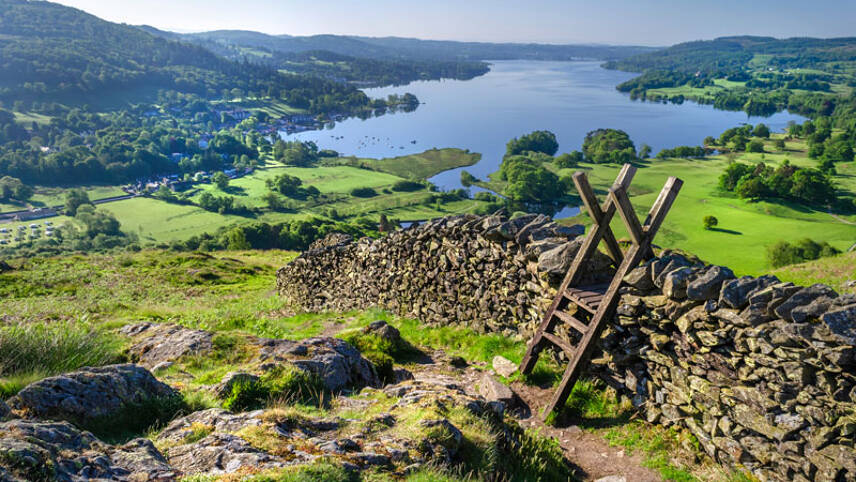Register for free and continue reading
Join our growing army of changemakers and get unlimited access to our premium content

Pictured: Lake Windermere, Lake District
To mark the nature-themed day in the agenda at COP28, the UN-convened climate summit in Dubai, the UK Government confirmed plans to implement its long-awaited ban on forest risk commodities linked to illegal deforestation overseas.
This ban was included in the Environment Act, which was ratified in late 2021 after a tumultuous passage through Parliament that lasted two years. Businesses and NGOs alike have bemoaned the continual delays to the ban’s implementation, as well as the fact that it only covers deforestation that is illegal in the country of origin. Former Environment Minister Zac Goldsmith also expressed these concerns.
On delays, WWF estimates that almost eight million hectares of primary forest has been lost globally in the last two years, since the Environment Act received Royal Assent. Global Witness has linked 50,000 acres of this to goods imported to the UK.
The Department for the Environment, Food and Rural Affairs (Defra) itself has stated that an area the size of the UK is ploughed up each year to meet Britain’ demand for commodities.
Defra has today (9 December) set out the scope of the due diligence requirements. They will apply to all organisations with a global turnover of at least £50m, with potential exemptions for firms using less than 500 tonnes of any of the listed commodities each year.
These businesses will need to report every year on deforestation risks in supply chains. If they are found to be using commodities from land that was illegally deforested or converted, they will be banned from using them for profit.
Palm oil, cocoa, soy and cattle products are covered by the new rules.
Defra has not yet confirmed when the requirements will come into force. WWF UK’s chief executive Tanya Steele said forests “haven’t a moment to lose”, so the ban “must be implemented in Parliament as swiftly as possible”.
Steele also called the move a “first step”. WWF and many other NGOs including Friends of the Earth want to see the rules expanded to cover additional commodities such as rubber and coffee, and to cover legal deforestation.
The British Retail Consortium’s director of food and sustainability Andrew Opie said: “This UK Deforestation Due Diligence legislation will give confidence to British retailers and their customers alike, helping retailers meet their ambitious targets on deforestation and enable a greater supply of deforestation-free products in the UK.
“Tackling deforestation requires global cooperation and we look forward to seeing further detail as to how the legislation will align with European proposals.”
The EU’s proposed deforestation law, the EU Deforestation-Free Regulation, would ban commodities such as cocoa, coffee, palm oil, and wood from entering the bloc if they are linked to illegal deforestation, or legal deforestation carried out after 2020.
30 by 30 goal
Also today, Defra has published a roadmap for delivering its so-called ’30 by 30’ commitment in England.
This commitment, made under the UN’s biodiversity treaty, involves the UK setting aside 30% of land-based and marine habitats for nature conservation or restoration by the end of the decade.
A recent analysis revealed that only 6.5% of the land in England is currently protected in ways that can count towards the 30% target. Members of the Lords who conducted this analysis warned that Defra would only have a slim chance of delivery, especially if it treated the goal as a long-term and non-urgent priority.
Defra’s new roadmap provides more details on which land can contribute to the target and how. It maps the areas which do already count; those which could with greater protection; and those with the potential to contribute in the future.
It notes that many Sites of Special Scientific Interest (SSSI’s) are currently not in “favourable condition” and reiterates a pledge to update all SSI condition assessments by the end of January 2028. By this time also, half of the sites deemed to be deteriorated should be involved in action plans to get them to favourable condition.
Also reiterated are commitments announced by Defra late last month, including 34 new Landscape Recovery Schemes projects and a new National Park.
These feed into an overarching target to restore or create more than 500,000 hectares of habitat by 2042, of which at least 140,000 hectares should be delivered by January 2028.
It bears noting that the plan does not cover marine habitats. Defra has, however, published its response to a consultation held last year on principles of marine net-gain. Marine net-gain rules are set to be mandated just as biodiversity net-gain rules will be, from next year for housebuilders.


The elephant in the room ‘illegal in the country of origin’ allows a huge exploitable loophole especially if we are talking about countries like Malaysia and Indonesia